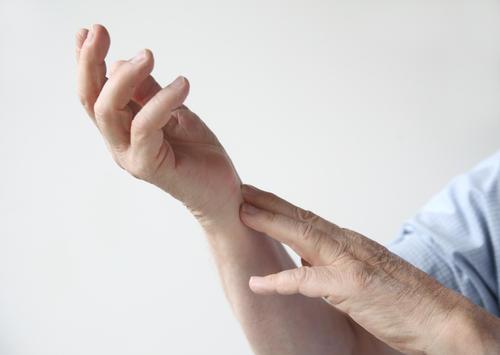Sometimes you may wake up with a tingling feeling in your arms. The feeling disappears after a short while and is not a sign of any circulatory or neurological condition. However, this feeling could be a symptom of a stroke or ulnar nerve entrapment if it is frequent. You should seek medical attention and pay attention to any other symptoms.
Causes of Hands Fall Asleep While Sleeping

1. Sleeping on Your Hand for Long
You are likely to experience a tingling arm or hand if you sleep on it for a long period. Your body weight will exert pressure on your nerves and disrupt the circulation of blood to your arm. Sleeping on your arm may compress the arteries and restrict the flow of blood with nutrients to your arm tissue. Consequently, your arm will not send signals to your brain or understand signals from your brain. Your arms or hands fall asleep while sleeping until normal blood circulation resumes.
2. Lack of Vitamin B
A vitamin B deficiency may result from an incorrect or deficient diet. The consequences of this deficiency are often overlooked and include continued fatigue, skin paleness, and drowsiness. Others symptoms include numbness and tachycardias sensations in the legs and hands especially at night.
3. Working Throughout the Day
Manual work such as sewing, typing, using scissors and other tools overload the wrists and affect the nerves in the hands. Bending and unbending motions overload the wrist and leads to pain when the wrist relaxes at night. Tendons and nerves release pressure intensely when relaxed.
4. Fluid Retention
Excess weight from an unhealthy diet and lack of exercises may cause swelling in your hands and feet. Fluid retention causes this swelling. The tingling sensation is intense at night. It results from the disruption of circulation and the resultant pressure leads to the tingling sensation.
5. Entrapment of the Ulnar Nerve
Extended pressure on the ulnar nerve in your arm interferes with the function of the nerve and makes the hand numb. Sleeping with a bent elbow compresses the ulnar nerve. The symptoms are worse if you suffer from an ulnar nerve entrapment. You will wake up with tingling arms or hands. It is not always possible to establish the cause of ulnar nerve entrapment. The main cause of this condition is swelling of the elbow, which may result from bone spurs, fractures in the arm, cysts and arthritis.
6. Stroke
Statistics indicate that one in every seven strokes occurs when a patient is sleeping. A stroke is an obstruction of the flow of blood to the brain. This obstruction may result from hemorrhage in one of the cerebral arteries or blockage of any artery that supplies blood to the brain. Stroke symptoms including blurred speech, headache, tingling or numbness, feeling disorientation, and failure to understand a conversation. You should seek medical attention immediately if the tingling feeling in your hands is accompanied by these stroke symptoms.
7. Carpal Tunnel Syndrome
Pressure on the median nerve compresses the nerve. This nerve gives sensations to the fingers and innervates forearm and hand muscles that enable you to hold an object between your forefinger and the thumb. Any numbness, tingling, impingement, or pinching in the median nerve will lead to pain in the fingers, hand, and forearm. The first symptom is fingers falling asleep or becoming numb at night. The numbness and pain may extend to the forearm and sometimes to the shoulder.
8. Other Causes
- Diabetes causes arms or hands and feet to fall asleep even when one is awake and relaxed.
- Hand surgery and arthritis damage or irritate the nerves.
- Other causes of numbness include spinal cord injury, ganglion cyst, Raynaud's disease, syphilis, amyloidosis, chronic alcohol use, Lyme disease, HIV/aids, peripheral neuropathy, guillan-barre syndrome, brachial plexius injury, cervical spondylosis, sclerosis, vasculitis, and syringomyelia.
How to Deal With It
When hands fall asleep while sleeping, you can use the following remedies:
- Take a tablespoon of linseed oil before sleeping.
- Take ginger tea to boost circulation.
- Fill your bathroom sink with water and ice cubes and then dip your hands.
- Eliminate acidic drinks and salt from your diet.
- Stay hydrated by drinking at least two liters of water daily. Take an artichoke drink to prevent fluid retention.
- Ensure your diet is rich in Vitamin B. Leafy green vegetables, potatoes, bananas and tuna provide this vitamin.
- Wear a compression wristband when required to use your wrists and hands for a long time.
- Do exercises that strengthen your arms, shoulders and neck.
- Take anti-inflammatory drugs to relieve tendonitis or carpal tunnel symptoms.
- Wake your hands by placing them above your heart.
- Avoid sleeping on your arm. Avoid sleeping when your hands are curled or in a fist.
- Practice sleeping on your back and use soft pillows.
- Do not sleep with your hands under your head or pillow.
- Use nocturnal braces for your hands and wrists such as splints.
Warning
It is important to know why your hands fall asleep while sleeping. You should consult your doctor if you experience numbness for a long time or if it spreads to other body parts.
When to get emergency medical attention:
Call 911 or get immediate help if numbness starts suddenly and is accompanied by confusion, dizziness, paralysis or weakness, difficulty in talking and a severe, sudden headache.
Schedule regular visits to the hospital if your numbness:
- Affects one part of your hand
- Spreads to other body parts
- Is related to repetitive motions in certain activities or tasks
- Is irregular
- Persists or worsens with time
- Spreads to both sides of your body
